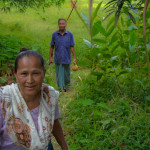The issue of women’s land rights for land restoration will be discussed at a high-level panel “This Land is Our Land: Gender perspectives on tenure and rights” at the Global Landscapes Forum in Paris, December 6. In preparation for that event, we have asked a number of experts: “What would it take to strengthen women’s >> Read more
Why paying attention to gender matters for climate change adaptation
By Elizabeth Bryan, Patti Kristjanson, and Claudia Ringler Until recently, there has been little evidence supporting the need to focus on the gendered dimensions of agriculture and climate change. Why? Because few researchers have been talking to women in agriculture as well as men--both of whom contribute to solving the food security challenges posed by >> Read more
Science on the Pulse: 10 essential reads on gender and land tenure
What are we actually talking about when we refer to women’s land rights? In the lead up to the Global Landscapes Forum event, This land is our land: Perspectives on land access and restoration, Thrive asked the International Food Policy Research Institute (IFPRI) to share ten essential articles for gaining an understanding of the key >> Read more
Women, Land and Food event materials now available
The Women, Land and Food event hosted by the International Food Policy Research Institute (IFPRI), USAID, and Landesa on October 27, 2015, examined the challenges, programming lessons and evidence demonstrating the profound link between land rights, food security and women’s empowerment. Now, you can further explore related event content: Watch a recording of the full discussion View exclusive >> Read more
Takeaways from twenty years of gender and rural development research at IFPRI: Closing gender gaps in agriculture through property rights and governance
The following blog by IFPRI gender experts Sophie Theis, Agnes Quisumbing, and Ruth Meinzen-Dick is the second in a four-part series leading up to the Policy Seminar on "Beijing +20 and Beyond: How Gender Research Is Changing the Landscape of Food Policy," to be held on October 14, 2015 at IFPRI's Washington, DC headquarters. This >> Read more
Takeaways from twenty years of gender and rural development research at IFPRI: Household decision making and women’s control over resources
The following blog by IFPRI gender experts Sophie Theis, Agnes Quisumbing, and Ruth Meinzen-Dick is the first in a four-part series leading up to the Policy Seminar on "Beijing +20 and Beyond: How Gender Research Is Changing the Landscape of Food Policy," to be held on October 14, 2015 at IFPRI's Washington, DC headquarters. The >> Read more
Update to IASC Guidelines for Integrating Gender-Based Violence Interventions in Humanitarian Action
The IASC Guidelines for Integrating Gender-Based Violence Interventions in Humanitarian Action has been updated (from 2005) and was launched with a great, accessible new website: http://gbvguidelines.org/
How can ICTs promote gender equality in rural areas?
e-Agriculture is collecting information on the topic 'Gender and the use of ICTs for agricultural and rural development - How ICTs can promote gender equality and women’s empowerment in rural areas', to prepare a paper on the subject. ICT initiatives are often generic and fail to recognize that the introduction of ICTs in a community will >> Read more
Report Release: Measuring Women’s Economic Empowerment and M&E Guidelines
From the Women's Economic Empowerment: A Roadmap website: Design challenges are common to most program evaluations, but this is especially true for programs that measure women's economic empowerment. This is because of the interdependence between women's economic and social roles, which influences their business choices and returns to those businesses. For example, because women have >> Read more
Kenya Justice Project and AskAg Discussion on land tenure and governance
The Kenya Justice Project (KJP) focused on educating key stakeholder groups through legal literacy and skills trainings, peer sessions, community conversations, and public information activities to increase legal knowledge around constitutional rights and traditional leaders’ responsibilities related to land. Read more about the project’s accomplishments, including the election of 22 women elders, here. Additional information >> Read more
- « Previous Page
- 1
- …
- 7
- 8
- 9
- 10
- 11
- …
- 20
- Next Page »

